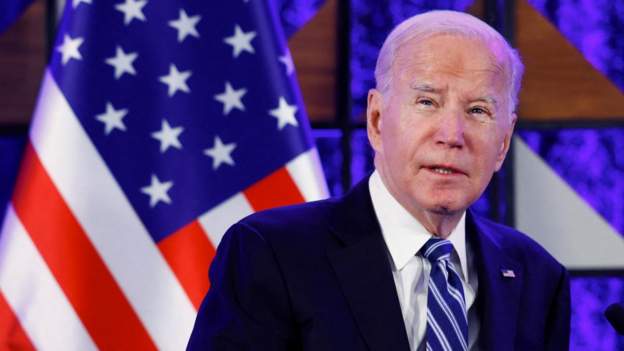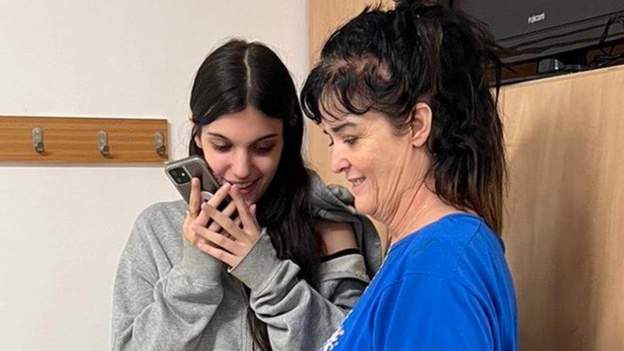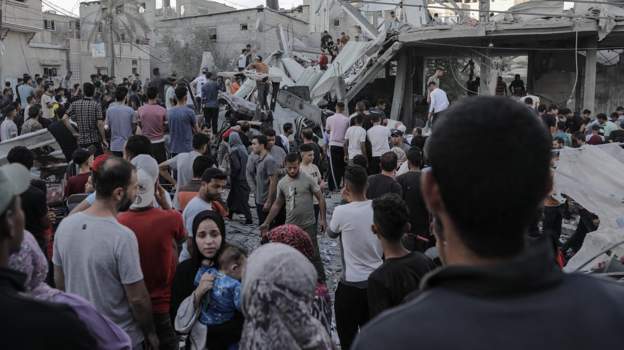BBC WORLD NEWS: Trucks carry aid and coffins into Gaza – but UN calls it ‘drop in the ocean’
With updates from Rushdi Abualouf in Gaza; Lyse Doucet, Lucy Williamson in southern Israel; Jeremy Bowen, Paul Adams, Yolande Knell, Tom Bateman and Joel Gunter in Jerusalem; Anna Foster in northern Israel; and Hugo Bachega in Beirut.
Summary
- Trucks carrying aid, and one loaded with coffins, have entered Gaza for the first time since the Israel-Hamas war erupted
- The BBC counted 20 vehicles with white flags moving through the Rafah crossing into Gaza from Egypt – the UN called it a “drop in the ocean” of what’s needed
- Yesterday, Hamas released its first hostages since its major surprise attack on Israel two weeks ago
- Mother and daughter Judith and Natalie Raanan were among about 200 people abducted; Natalie’s half-brother has told the BBC of his “overwhelming” joy at their release
- Israeli PM Benjamin Netanyahu says Israel is trying to free more hostages, though his forces will also “fight till victory”. Israel continues to bombard Gaza
- It’s two weeks since Hamas launched its assault on Israel, killing more than 1,400 people. Palestinian officials say more than 4,000 have been killed in Gaza since then
- And the leaders of Arab and European countries are meeting in Egypt to discuss the crisis, but expectations are low because key players like Iran – and Israel itself – aren’t attending
Biden reiterates US commitment to get aid into Gaza

In the US, President Biden says his administration remains committed to ensuring that civilians in Gaza will continue to have access to food, water and medical care without diversion by Hamas.
In a statement, he said:
“The first convoy of humanitarian aid since Hamas’s surprise attacks on 7 October passed through the Rafah crossing into Gaza today.”
Biden also says the US is working “around the clock” to facilitate US citizens and family members to leave Gaza safely.
Israeli military says it will increase attacks on Gaza
In the last few minutes we’ve heard from Daniel Hagari, a spokesman for the Israel Defense Forces (IDF), who says Israel’s military plans to increase its strikes on Gaza, starting this evening.
“We’ll deepen our strikes, minimise the risks to our forces in the next stages of the war and we’re going to increase the attacks from today,” he told a press conference.
Hagari urged residents of Gaza City “to continue moving south for their safety”. (There’s more detail on the mass evacuation from north to south Gaza in our previous post.)
The Israeli military began carrying out retaliatory airstrikes on Gaza following Hamas’s surprise attacks on Israel two weeks ago, which killed more than 1,400 people.
Palestinian health officials say more than 4,000 people have been killed in Gaza since then.
Israel is widely expected to launch a ground offensive into the Gaza Strip soon, but the timing remains unknown.
How many people have moved to southern Gaza?
Israeli officials have repeatedly told all residents in the northern Gaza Strip to leave and move south of Wadi Gaza – a river valley in the centre of the territory. The evacuation order impacts around 1.1 million people.
Earlier, a spokesman for the Israel Defense Forces (IDF) said 700,000 people in Gaza had so far made the move south.
The northern part of the Gaza strip, including Gaza City – which was home to around 775,000 people before the conflict began – is the most densely populated part of the region.
In a press conference earlier, translated by Sky News, the IDF spokesman added that some 307 Israeli soldiers had been killed in total since the attack by Hamas on 7 October.
As supplies of food, water and medication began to move across the Rafah crossing from Egypt, he claimed the humanitarian situation in Gaza was “under control”. But, as we’ve been reporting, humanitarian groups and the UN say the situation is desperate and much more aid is urgently needed.
Leaflets dropped over Gaza come with a sinister warning
Paul Adams – Diplomatic correspondent, in Jerusalem
For a moment this morning, celebrations broke out on either side of the Rafah crossing as trucks – stuck for more than two weeks on the Egyptian side – finally crossed into the Gaza Strip with their precious cargoes: food, water and medical supplies.
But with more than two million Palestinians facing increasingly dreadful conditions and Israeli warplanes obliterating whole neighbourhoods of the Gaza Strip in relentless, round-the-clock airstrikes, today’s aid delivery barely scrapes the surface of what’s needed.
And there are signs the situation could soon get worse.
Leaflets, dropped over Gaza City, come with a sinister warning: anyone who does not move south may end up being seen as what is described as an accomplice to a terrorist organisation.
In his daily press briefing, Daniel Hagari, Israel’s chief military spokesman, once again attempted to persuade those who remain in the north to move.
Humanitarian conditions are anything but under control, though. Aid agencies say vastly more help is needed – including fuel.
Hamas hostages: The people taken from Israel


As we reported earlier, the Israeli military believes about 210 people are currently being held hostage by Hamas.
Hamas said it’s hidden them in “safe places and tunnels” within Gaza.
The Israel Defense Forces say the hostages include 20 children and between 10 and 20 over-60s. Two American hostages – mother and daughter Judith and Natalie Raanan – are the first to have been freed (you can read more about this in our previous post).
We’re keeping a close eye on any updates about those being held – including the people confirmed by the BBC, or credibly reported, to have been abducted by Hamas from Israel.
- You can read their stories here
Father of freed hostage praises ‘tough’ daughter


Ftom Nomia Iqbal North America correspondent
I’ve just chatted to Natalie Raanan’s father, Uri Raanan, in Chicago – he moved here from Israel 40 years ago.
“I did not lose hope. I spoke to my daughter for two minutes yesterday on the phone, she is feeling very good and looking forward to coming home,” he told me.
He said it’s Natalie’s 18th birthday on Tuesday and he hopes she’ll be back by then.
Natalie and her mother Judith yesterday became the first hostages to be freed by Hamas. They were received by the Israel Defense Forces at the Israel-Gaza border, before being taken to a military base to be reunited with family members.
I asked Uri what his thoughts were when he saw the first pictures of his daughter and ex wife after they were held captive for nearly two weeks by Hamas.
“She looks very well, they look very well. I was so happy,” he said, adding that his daughter is a “tough girl”.
“It’ll take time for her to get back to normal after this, but she’ll be fine.”


POTUS Copyright: POTUS Hamas says Natalie (left) and her mother Judith were freed for “humanitarian reasons”
A quick recap of today’s developments


EPA:


Day has turned to night in Israel, where two weeks ago Hamas launched its surprise attack, prompting Israel to launch retaliatory air strikes. Here’s where things stand at the moment.
Pro-Palestinian protests have been held in several countries around the world, including London in the UK, Rome in Italy and Mombasa in Kenya. The BBC’s Dominic Casciani witnessed the march in London – here’s his take.
Twenty trucks carrying humanitarian aid were allowed through the Rafah border crossing from Egypt into Gaza earlier – the first since the conflict began. The UN says the delivery of aid is a “drop in the ocean” of the amount that’s needed.
Israel estimates that the number of hostages currently being held by Hamas in Gaza is 210. Yesterday, mother and daughter Judith and Natalie Raanan became the first people to be released. There’s more on those being held here.
Egypt hosted a summit of global powers to discuss the Israel-Gaza war, though Israel, Iran and the US were not present.
The Hamas-run heath ministry says 4,385 people have died in Gaza in the last two weeks. Israel’s military says at least 307 soldiers have been killed in that same timeframe, and the Hamas attacks in Israel have killed about 1,400 in total.
END
For much more on this story go to: BBC





